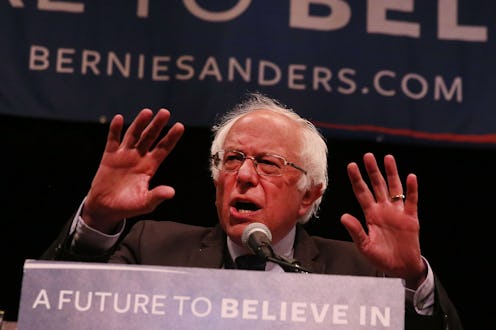News
Bernie Sanders' Goals Are Evolving
It's been weeks since the final Democratic primary contest went down, as the citizens of Washington, D.C. cast their votes. They overwhelmingly backed former Secretary of State Hillary Clinton, hot on the heels of her big wins in New Jersey and California. But even before that, she had the nomination virtually locked up ― delegate math doesn't lie. But Sanders hasn't dropped out yet, and to the contrary, he's still officially in this thing. So, maybe it's time for some updates on the Bernie Sanders campaign? To take the temperature, and figure out just where he's at?
Well, as sad as it might be for anyone still hoping on a last-ditch grab at the nomination, it must be noted that his campaign is bleeding high-level staffers at the moment, a natural consequence of a slew of seasoned political professionals waking up, rubbing their eyes, and groaning "damn, we lost." This was a stream that actually started flowing before all the votes were cast, in advance of the massive California primary ― he's been reportedly losing staff for more than a month, on top of the fact that his fundraising all but dried up late in the game, leaving his once-stuffed war chest bare.
And on Monday, he lost a particularly high-profile name. Press secretary Symone Sanders (no relation) departed, telling CNN she was "looking forward to helping elect down-ballot Democrats and do all I can to ensure a Democrat is the 45th president of the United States."
Sanders ultimately finished the Democratic primary schedule with 1,831 pledged delegates, compared to Clinton's 2,220. In historical terms, it was a pretty tight race, although the last contentious primary the Democrats weathered in 2008 was even a little closer ― in that race, Clinton bowed out trailing then-Sen. Barack Obama by a mere 312 pledged delegates, as well as while winning the popular vote (although Obama's failure to appear on the Michigan ballot that year muddied the math).
Sanders, by contrast, finished 389 pledged delegates behind, and for all the talk of convincing superdelegates to change their votes, everything his campaign's done since the final contest makes it pretty clear that they've accepted the reality as it is. Rather than continue laying into Clinton, or talking as though the 2016 Democratic National Convention would be a contested, bristling affair, Sanders has adjusted his rhetoric to prepare for the months to come ― he's frequently remarked that he plans to do "everything [he] can to defeat Donald Trump" in the fall.
That's not to say he's rolling over, however, and that point was demonstrated pretty vividly by his appearance on CNN's State of the Union with Jake Tapper on Sunday morning. Referring to his repeated pledges to work to defeat Trump, Tapper challenged Sanders on whether he was really living up to that promise, having failed to actually endorse Clinton, and by hinting at his reticence to support her by saying he'd "in all likelihood" do so. And Sanders' response was pretty telling.
I am gonna do everything that I can do to defeat Donald Trump. But a lot of that responsibility, about winning the American people over to her side, is going to rest with Secretary Clinton. Is she going to address the issues ― we got something like 12, 13 million votes. And those people voted for me, I believe, because they said 'it is time to have a president prepared to have the guts to stand up to big money interests, to stand up to the greed of corporate America, to end these disastrous trade policies, to make certain that the wealthiest people and largest corporations start paying their fair share of taxes, to rebuild our infrastructure, to create health care, to all people. So it's not just Bernie Sanders saying 'oh, just vote for Hillary Clinton.' It is Hillary Clinton standing up and saying 'you know what, these are the things we need to do.' And if she does the right thing I am absolutely confident that the vast majority of my supporters will vote for her.
This is a somewhat less conciliatory tone than Sanders has used in the recent past, and it both speaks to what he's trying to get out of his second-place finish ― to drag the Democratic Party to a more progressively pure, economic and social justice-centered position ― and lays bare the fact that he doesn't actually regard defeating Trump as his top priority.
Not at the moment, at the very least. It seems a little significant that he said (emphasis mine) "I am gonna do everything I can do to defeat Donald Trump," rather than "I am," because as it stands now, he really isn't. Whatever you think of the politics of party unity, there's only one way left to keep President Trump from becoming a reality, and that's for Clinton to beat him.
While an endorsement will still probably come eventually, perhaps on the heels of some particularly progressive policy roll-out on Clinton's part, it's quite clear that Sanders views transforming the Democratic Party as his 1A issue right now. Doing "everything" to defeat Trump might be a hugely compelling 1B, but if it were actually his top priority, he'd at least be trying to make the case for Clinton to his supporters right now.
In other words, you should probably believe him when he says he's taking his campaign all the way to the Democratic National Convention in Philadelphia in July, even if the goals and the shape of his campaign have changed entirely by then.
